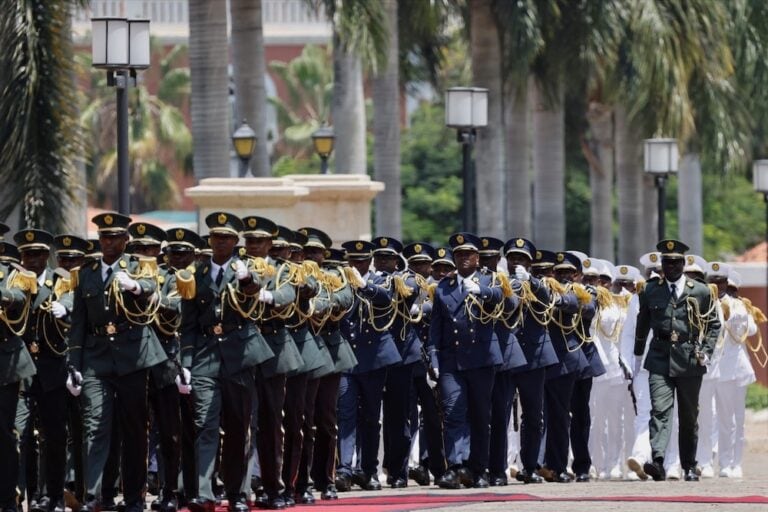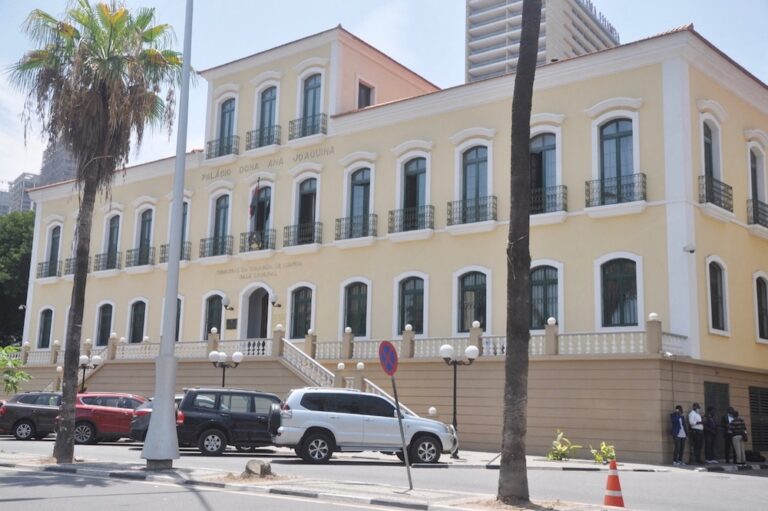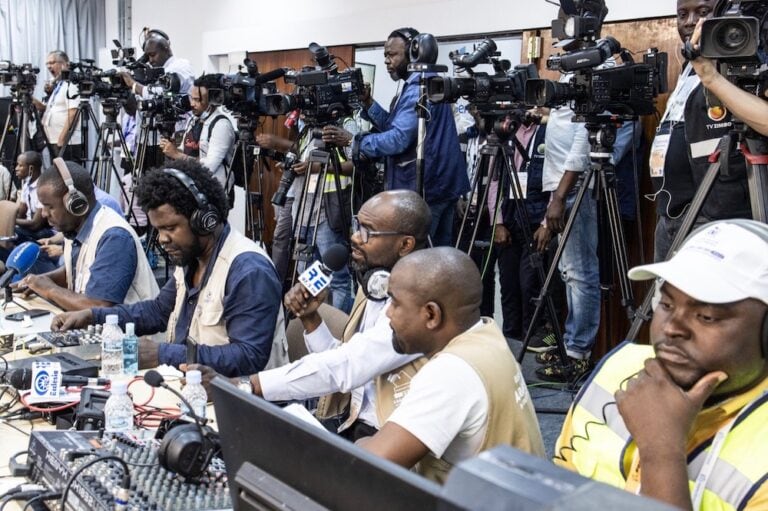(MISA/IFEX) – The following is a MISA report on the state of the media in Angola: Dear friends and colleagues, Following is a chronology of events and incidents involving the media in Angola since January 1999. The trend suggests a systematic decline in respect for the media in Angola, particularly from the government, and over […]
(MISA/IFEX) – The following is a MISA report on the state of the media in
Angola:
Dear friends and colleagues,
Following is a chronology of events and incidents involving the media in
Angola since January 1999. The trend suggests a systematic decline in
respect for the media in Angola, particularly from the government, and over
a short period of time. The most important and damaging ploy by the
government has been to cast wide aspersions on the independent media by
labeling them enemies or supporters or sympathisers of the enemy. In the
context of the war situation, such characterisations can be fatal.
The need for concerted action at this stage to speak out against the
emerging trend in Angola is very crucial for several reasons:
To guard against an even further decline in respect for the media by making
it clear to the authorities that those outside Angola are well aware of what
is going on, and that they are being watched and monitored;
To ensure during this period of war that there is accountability from those
in power and respect for fundamental human rights;
To reassure media workers in Angola, who for a number of reasons suffer a
measure of isolation (a country in a state of war and poor communications
infrastructure, Portuguese-speaking in a largely non-Portuguese speaking
part of the world), that they have support and solidarity from individuals
and organisations around the world;
To ensure that media workers in Angola don’t suffer the same fate as many
other media workers in conflict situations, where their rights are trampled
on arbitrarily and they end up suffering heavy casualties in their quest to
inform people;
The show of support and solidarity for the independent media in Angola is
particularly important in view of the fact that it was only less than a
decade ago that the first independent media began to emerge in Angola. An
onslaught of the nature we have seen unfolding in that country over the past
few months could prove fatal for the further development of this sector.
There are currently six independent newspapers publishing in the capital
Luanda. The only other independent paper in the rest of the country is a
monthly paper in Moxico. There are five independent radio stations, two of
which are outside Luanda. The government media, which is heavily controlled
politically, dominates the media landscape. The state radio reaches all the
provinces via several stations, the government owns the country’s only news
agency, Angop, and the country’s only daily newspaper, “Jornal de Angola”.
Chronology of the main incidents affecting the media in Angola January to
June 1999.
JANUARY 1999
Angolan authorities issue an implicit order for a black out of news about
the civil war in the country. This order was communicated via a memo from
Communications Ministry to the state media, telling them not to mention
anything pertaining to the war. It was reported on by the State media, who
promptly responded by reducing their coverage of the war. The independent
media, however, continued to report about the war and they
remained the only sources of information about the war. The government did
not take too kindly to this and in an editorial piece in the
government-owned daily, “Jornal de Angola”, it was suggested that by
reporting on the war, journalists were “facilitating” the efforts of the
enemy [the National Union for the Total Independence of Angola – UNITA] in
it’s war against the government. The article originated from Public
Relations and Information office of the Angolan Armed Forces (FAA) General
Staff.
The managing director and director of the private commercial FM Radio Morena
(in Benguela province), Jose Cabral Sande and Jose Manuel Alberto, were
arrested when the police raided the studios soon after the station had
rebroadcast a news programme from Radio Televisao Portuguesa (RTP) featuring
the Secretary General of UNITA. By order of the General Staff of the Army,
the two were held at a local police station for
“disobedience and offences against the head of state”. The case was taken to
court and the two journalists were released unconditionally because of
insufficient evidence.
FEBRUARY 1999
The Catholic Church-owned station, Radio Ecclesia, was forbidden to
broadcast the Africa programme of the Portuguese radio Renasenca on three
separate occasions as the reports contained material concerning the fighting
between the Angolan forces and UNITA and featured members of UNITA’s
leadership.
MARCH 1999
The Minister of Communication, Hendrik Val Neto, announces that reporting
about draft evasion would be considered a criminal act and that journalists
who disregarded this would “face the sanction of the law, including
cancellation of the licences to publish and to broadcast”.
APRIL 1999
Journalist Josefa Lamberga, a correspondent with the Voice of America, was
assaulted by a corporal from the Angolan Armed Forces (FAA) apparently as a
result of a report she had filed about the recruitment of young boys into
the FAA. She was barred from entering a recruitment centre in Luanda, one
day after the station aired an interview featuring a young recruit
complaining about the recruitment of only poor and black
youngsters. The army corporal and two other soldiers chased Lamberga,
forced her to stop her car, and slapped her twice. No action was taken
against the corporal or any other FAA members involved in the incident.
Journalist William Tonet, the director of the weekly newspaper “Folha 8” was
interrogated for several hours by the Criminal Investigation Department in
Luanda in connection with a charge filed by the military attorney’s office
alleging that certain stories published by “Folha 8” were inciting young men
to run away from military duty and were insulting to government. The police
investigating officer asked Tonet to reveal his sources, accusing him of
jeopardising state security. Two other “Folha 8” journalists, Rafael Marques
and Pascoal Mukuna, were also interrogated in connection with the same
allegations.
The Chief of the Civil Office of the President, Jose Leitao, filed charges
against Gustavo Costa, an Angolan journalist with the Portuguese newspaper
“Expresso”. He is accused of defamation and injuries in connection with an
article on corruption at the presidential palace.
The residence of Gustavo Costa was searched by three police officers. The
men, who produced a warrant signed by the state attorney with the Criminal
Investigation Department, said they were looking for evidence and took two
diskettes they found on Costa’s desk.
MAY 1999
Joaquim Alves, a journalist with the weekly newspaper “Actual Fax” was
attacked and beaten near his house by three armed individuals who accused
him of having written a story in which a businessman was referred to as a
“Savimbiast”.
Laura Pawson, the Luanda-based correspondent for the BBC and Reuters news
agency, was assaulted by a group of men just outside a restaurant in the
Angolan capital. Her attackers threatened her with retaliations if she
continued to send stories criticising the government.
Freelance journalist Machado Irmao – who regularly contributed to the
independent weekly “Actual” – was attacked and beaten up by people alleged
to have been wearing police uniforms and driving a police truck. Irmao was
apprehended by his attackers while driving with a friend, who then also
witnessed the attack. Irmao went into hiding for about two weeks immediately
after the attack out of fear for his attackers, who warned him to keep his
mouth shout. It was only after re-surfacing that he spoke to MISA-Angola
about the attack. Irmao said that during the attack, the attackers shouted
that he was one of the journalists who was writing bad stories about the
government.
The residence of Herculano Coroado Bumba, the Angolan correspondent for the
Portuguese Radio TSF, was searched by two men who forced themselves into his
home, saying they were “looking for arms”. The journalist had been receiving
anonymous phone threats in connection with his work.
JUNE 1999
The Minister of Communication, Hendrik Val Neto, warned of a crackdown
against journalists who were “unpatriotic” or allegedly “inciting treason”.
The minister clearly stated that the Angola government was considering
“resorting to violence” against independent media which did not support the
government in its war against UNITA. He described certain private media as
being the “fifth column of Jonas Savimbi’s rebel movement” and warned that
certain independent publications may be banned.
The Deputy Minister of Communication later stated that the independent media
should be aware of the limits of press freedom and should stop jeopardising
the state security.
Journalist Gustavo Costa expressed fear for his life after revealing that he
had come under political and psychological pressure to reveal the sources of
his article published in a Portuguese paper in April. Costa said that he had
been visited on several occasions by “influential people close to the
president’s office”, who suggested that he reveal his
sources. Jose Leitao, the Chief of the Civil Office of the President, who
filed charges against Costa over the article, was quoted as saying that he
was afraid his enemies would take advantage of the situation to attack the
journalist and put the blame on him.
Media Contacts in Angola
Please distribute these contacts to the media widely along with the
chronology and any other letters and/or statements, and urge them to
highlight the situation in their media through reports, features and/or
interviews with media workers in Angola.
PRINT MEDIA
AGORA (weekly)
Contact persons: Antonio de Freitas (Chief Editor), Aguiar dos Santos
(Director)
Tel/Fax: +244 2 323 477
E-mail: angora@ebonet.net
ACTUAL (weekly)
Contact persons: Leopoldo Baio (Director)
Cell: +244 9 501006
ANGOLENSE (bi-weekly)
Contact persons: Graca Campos (Chief Editor), Americo Goncalves
(Director)
Tel: +244 2 394 282/236
E-mail: angolense@netangola.com
COMERCIO ACTUALIDADE (weekly)
Contact persons: Carlos Miranda (Chief Editor), Victor Aleixo (Director)
Tel: +244 2 334060/392 542
Fax: +244 2 393 216
FOLHA 8 (bi-weekly)
Contact persons: William Tonet (Director)
Tel: +244 2 394 047/ 391 943
Tel/Fax: +244 2 392 289
E-mail: folha@ebone.net
O INDEPENDENTE
Contact persons: Jorge Augusto (Director)
Tel: +244 2 331 341
Cell: +244 9 504 138
Josefa Lamberga
Tel: +244 2 342 421
Tel/Fax: +244 2 340 510
Tel: (Home): +244 2 395 761
Gustavo Costa
Tel: +244 2 363 473
Cell: +244 9 503 168
RADIO STATIONS:
RADIO ECCLESIA
Contact Person: Antonio Jaka (Director), Paulo Juliao (Chief Editor)
Tel: +244 2 343 041
Fax: +244 2 343 093
E-mail: ecclesia@snet.co.ao
Radio Morena (Benguela)
Tel: +244 72 325 25
Fax: +244 72 327 31
Radio 2000 (Lubango)
Ph: +244 61 239 35/37
Fax: +244 61 239 37
MISA-ANGOLA
Contact person: Jorge Silva (National Director)
Ph/fax: +244 2 390096
cell: +244 9 508 153
GOVERNMENT CONTACTS:
Hon Jose Eduardo dos Santos
President of the People’s Republic of Angola
Fax: +244 2 392 733/ 391 476/ 331 898
Minister of Information
Mr Hendrick Val Neto
Fax: +244 2 343 495
Minister of Defence
Mr Kundi Paiama
Fax: +244 2 392 635 / 333 223
Chief of Staff
Joao De Matos
Fax: +244 2 393 983 / 393 990


